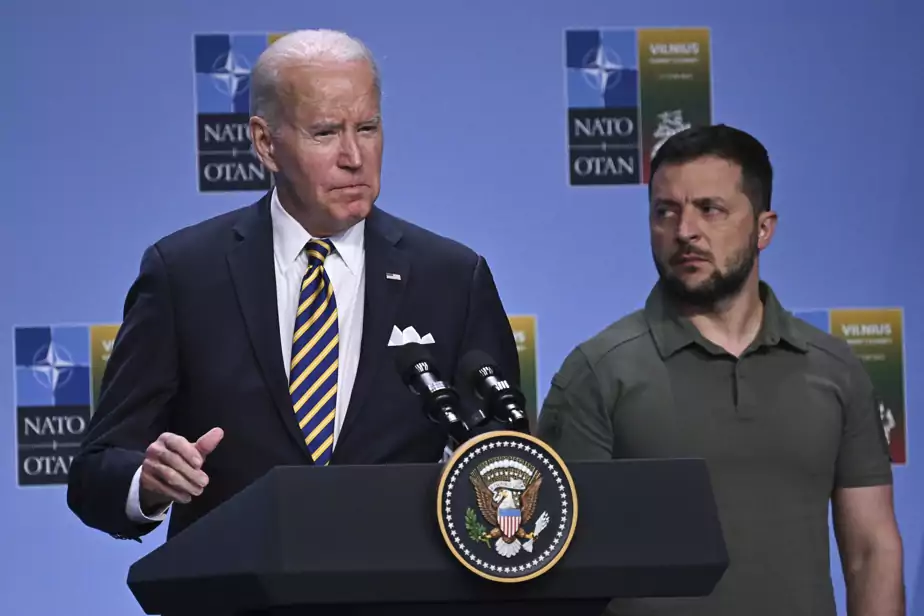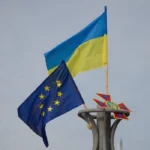(Vilnius) In Vilnius, US President Joe Biden knew he would have a lot to do to convince his Turkish counterpart Recep Tayyip Erdogan not to spoil the NATO summit. In the end, it was the Ukrainian head of state Volodymyr Zelensky who put his diplomacy to the test the most.
The Democratic leader considers what he describes as the unprecedented unity of Westerners in their support for Ukraine and NATO as one of the main successes of his first term and the Vilnius summit was to showcase it, ahead of campaigning for re-election in 2024.
However, when flying to Europe on Sunday, a first threat appeared on Mr. Biden’s diplomatic agenda.
A NATO member, Turkey had long threatened to torpedo Sweden’s membership. When suddenly, two days before the summit, President Erdogan issued a new unrealistic demand in exchange for his green light for Swedish membership and asked for the relaunch of talks on Turkey’s accession to the European Union.
Neither one nor two, Joe Biden takes his phone on the Air Force One presidential plane and calls Mr. Erdogan. The conversation lasts about an hour. The next day, Mr. Erdogan threw in the towel and gave up opposing Swedish membership.
The affair obviously did not end without intense diplomatic activity behind the scenes. Erdogan speaks with NATO Secretary General Jens Stoltenberg, Swedish Prime Minister Ulf Kristersson and European Council President Charles Michel.
The content of Mr. Biden’s call to his Turkish counterpart will remain confidential, apart from the announcement of a one-on-one in Vilnius. President Joe Biden’s national security adviser, Jake Sullivan, refused to confirm whether the sale of F-16 fighter jets to Turkey had been used as bargaining chips or whether Mr. Biden had forced his hand. .
“His goal in this conversation was really to see how the United States and Turkey could move forward positively, not to paint a dark or negative scenario,” Sullivan said. And NATO’s expansion and newfound meaning to its role is “to a large extent credited to President Biden’s personal leadership,” he said.
Angry tweet
The Turkish obstacle once ironed out, Mr. Biden found himself with a second challenge on his hands: the wrath of Ukrainian President Zelensky.
For a year and a half, the NATO countries, led by the United States, have funneled vast quantities of arms and economic aid to Ukraine, to stop Russian President Vladimir Putin’s conquest of this former soviet republic.
But Ukraine wants more: it demands NATO membership and with it the ultimate guarantee of security provided by a collective defense system and nuclear weapons.
So when it became clear that NATO was sticking to the American position of leaving Ukraine at NATO’s doorstep in the near future, with the argument that this would risk triggering a Third World War, the President Ukrainian explodes.
Even before landing in Vilnius, Volodymyr Zelensky attacks with a furious tweet the “absurd” refusal of the Americans and NATO to let his country join in the near future.
Twenty-four hours later, however, President Zelensky, full of thanks, left the summit, allowing the meeting of the Atlantic Alliance to end on a note of relative harmony.
The diplomatic efforts of the White House this time are obvious, a mixture of promises, cajoling and accolades.
According to US officials, it was Joe Biden who initiated the G7 countries’ pledge to provide long-term military support to Ukraine. At the same time, messages were passed to remind us that Ukraine was anything but abandoned.
“We are not sitting idly by. We are bringing an incredible amount of armament and military assistance to Ukraine,” said adviser Jake Sullivan.
On Wednesday morning, during his one-on-one with Mr. Zelensky, Mr. Biden displayed treasures of empathy and repeated to his interlocutor his promise “to get him what you need as quickly as we can get it to you. get “.
Mr. Zelensky then noted that the United States had already delivered more than 40 billion dollars in military aid and multiplied the messages of thanks for the “enormous assistance” received by Ukraine. Mr. Biden in turn thanked Mr. Zelensky for this “recognition to the American people”.
This article is originally published on lapresse.ca







